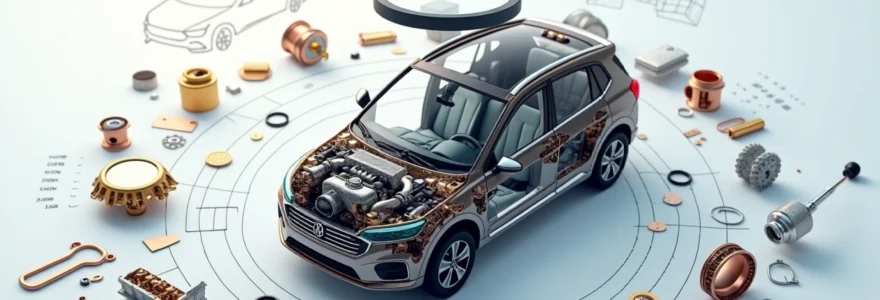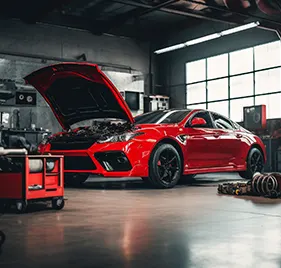Selecting the appropriate spare parts for your vehicle is crucial for maintaining its performance, safety, and longevity. Whether you’re a seasoned car enthusiast or a novice owner, navigating the world of automotive components can be daunting. With numerous options available, from original manufacturer parts to aftermarket alternatives, making informed decisions is essential. This comprehensive guide will equip you with the knowledge and strategies needed to choose the right spare parts for your car, ensuring optimal functionality and value for your investment.
Identifying the types of car parts
Before delving into the selection process, it’s important to understand the various categories of spare parts available in the market. Each type has its own set of advantages and considerations, catering to different needs and preferences of car owners.
Original manufacturer parts
Original Equipment Manufacturer (OEM) parts are produced by or for the car manufacturer and are identical to the components originally installed in your vehicle. These parts are designed to meet the exact specifications of your car model, ensuring perfect fit and optimal performance. While OEM parts are typically more expensive, they offer the assurance of quality and compatibility.
One of the primary advantages of OEM parts is their reliability. These components undergo rigorous testing and quality control measures to meet the manufacturer’s standards. Additionally, using OEM parts often helps maintain your vehicle’s warranty, as some manufacturers may void warranties if non-original parts are used.
Generic spare parts
Generic or aftermarket parts are produced by third-party manufacturers and are designed to function similarly to OEM parts. These components often come at a lower price point, making them an attractive option for budget-conscious car owners. While the quality of aftermarket parts can vary, many reputable manufacturers produce high-quality alternatives that meet or even exceed OEM standards.
When considering generic parts, it’s essential to research the manufacturer’s reputation and the specific component’s compatibility with your vehicle. Some aftermarket parts may offer improved performance or durability compared to OEM components, making them popular among car enthusiasts looking to enhance their vehicle’s capabilities.
Refurbished used parts
Refurbished or reconditioned parts are previously used components that have been restored to a like-new condition. These parts undergo thorough inspection, cleaning, and repair processes to ensure they meet specific quality standards. Opting for refurbished parts can be an economical choice, particularly for older vehicles or when budget constraints are a concern.
While refurbished parts can offer significant cost savings, it’s crucial to source them from reputable suppliers who provide warranties and guarantee the quality of their reconditioned components. Always verify the part’s condition and history before making a purchase to ensure it meets your vehicle’s requirements.
Criteria for choosing spare parts
Selecting the right spare parts involves considering several key factors to ensure compatibility, quality, and value for your investment. By evaluating these criteria, you can make informed decisions that benefit your vehicle’s performance and longevity.
Compatibility with the model
The most critical factor in choosing spare parts is ensuring they are compatible with your specific car model. Even slight variations in part specifications can lead to poor fit, reduced performance, or potential damage to your vehicle. To guarantee compatibility:
- Know your car’s exact make, model, year, and engine type
- Use your Vehicle Identification Number (VIN) to verify part compatibility
- Consult your car’s manual or a professional mechanic for guidance
- Utilize online parts catalogs that allow you to input your vehicle details
Remember, compatibility is not just about physical fit; it also involves ensuring the part meets the performance requirements of your vehicle’s systems.
Quality of materials used
The quality of materials used in spare parts directly impacts their durability, performance, and safety. High-quality parts are typically made from superior materials that can withstand the rigors of daily use and extreme conditions. When assessing the quality of spare parts:
- Research the manufacturer’s reputation and quality control processes
- Look for parts that meet or exceed OEM specifications
- Check for industry certifications or quality standards
- Consider the part’s warranty as an indicator of quality and durability
Investing in quality parts may require a higher upfront cost but can lead to long-term savings by reducing the frequency of replacements and potential vehicle damages.
Tips for buying spare parts
Navigating the spare parts market requires a strategic approach to ensure you get the best value for your money while maintaining your vehicle’s integrity. Here are some essential tips to guide your purchasing decisions:
Compare prices on offer
While price shouldn’t be the sole determining factor, it’s important to compare offerings from different suppliers to ensure you’re getting a fair deal. Keep in mind that the cheapest option isn’t always the most cost-effective in the long run. Consider the following when comparing prices:
- Factor in shipping costs and any potential import duties
- Look for package deals or bulk discounts for multiple parts
- Consider the long-term cost, including potential replacements and labor
- Be wary of prices that seem too good to be true, as they may indicate counterfeit or low-quality parts
Utilize online price comparison tools and consult multiple suppliers to get a comprehensive view of the market prices for your required parts.
Check the warranties offered
Warranties provide an additional layer of protection for your investment in spare parts. A robust warranty can offer peace of mind and potential cost savings if the part fails prematurely. When evaluating warranties:
- Compare warranty lengths and coverage terms between different suppliers
- Understand the claim process and any conditions that may void the warranty
- Consider extended warranty options for critical or expensive components
- Keep all purchase receipts and warranty documentation for future reference
A comprehensive warranty can be a strong indicator of a manufacturer’s confidence in their product’s quality and durability.
Prefer reputable sellers
Choosing a reputable seller is crucial for ensuring you receive genuine, high-quality parts and reliable customer service. When selecting a supplier:
- Research the seller’s history and customer reviews
- Verify their certifications and affiliations with recognized industry bodies
- Check their return policy and customer support options
- Consider their expertise in your specific car make and model
Establishing a relationship with a trusted supplier can lead to better service, access to expert advice, and potentially preferential pricing for future purchases.
Importance of automotive preventive maintenance
Preventive maintenance plays a crucial role in extending the life of your vehicle and its components. By proactively addressing potential issues, you can reduce the frequency of part replacements and maintain optimal performance. Key aspects of preventive maintenance include:
- Regular oil changes and fluid checks
- Timely replacement of wear items like brake pads and timing belts
- Adhering to the manufacturer’s recommended service schedule
- Addressing minor issues before they escalate into major problems
Investing time and resources in preventive maintenance can significantly reduce the overall cost of vehicle ownership and improve reliability.
Consider using a digital maintenance tracker or app to stay on top of your vehicle’s service needs. These tools can provide reminders for scheduled maintenance and help you keep a detailed record of all work performed on your car.
Frequent mistakes to absolutely avoid
When it comes to choosing and purchasing spare parts, certain common pitfalls can lead to costly mistakes. Being aware of these errors can help you make more informed decisions:
- Prioritizing price over quality: While it’s tempting to opt for the cheapest option, low-quality parts can lead to frequent replacements and potential vehicle damage.
- Neglecting to verify compatibility: Always double-check that the part is specifically designed for your vehicle’s make, model, and year to avoid fitment issues.
- Ignoring manufacturer recommendations: Deviating from the manufacturer’s specifications can compromise your vehicle’s performance and safety.
- Overlooking the importance of professional installation: Some parts require specialized tools or expertise for proper installation. Attempting DIY installation without the necessary skills can lead to improper fitment or damage.
- Failing to keep records: Maintain a detailed history of all parts purchases and replacements for warranty purposes and future reference.
By avoiding these common mistakes, you can ensure a smoother experience in maintaining and upgrading your vehicle with the right spare parts.

